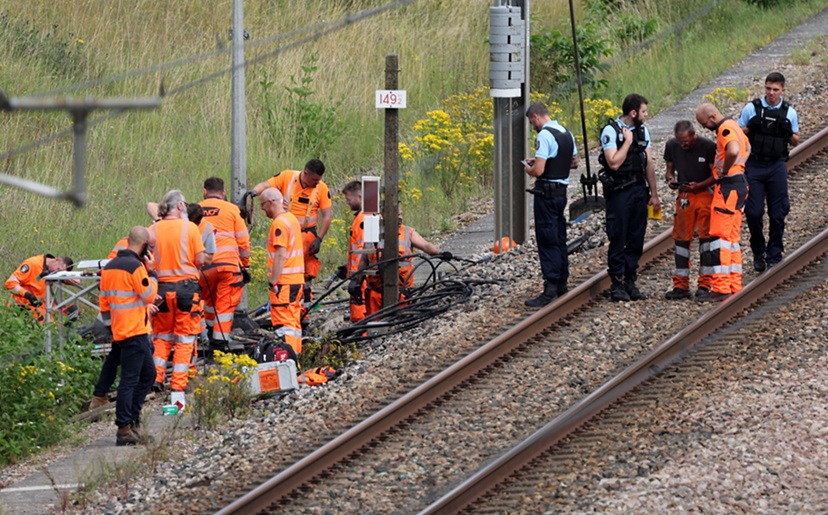Just as the world was poised to watch the grand spectacle of the Olympic Games’ opening ceremony in Paris, France’s rail network became the stage for a dramatic and audacious act of sabotage. In the wee hours of Friday morning, a series of fires erupted at multiple locations, effectively paralyzing high-speed rail services and casting a shadow over the eagerly anticipated event.
At around 4 a.m. local time, the meticulously planned operation struck three critical points in the rail network. Saboteurs targeted signaling cables, cutting and burning them in a move that would require painstaking repairs and lead to days-long disruptions. The high-speed lines connecting Paris from the north, southwest, and east were thrown into disarray.
An attempt to sabotage a line serving southeast France was thwarted, showcasing the vigilance of rail authorities. Yet, the successful attacks highlighted a deep knowledge of the network and a chilling level of coordination.
Prime Minister Gabriel Attal expressed the gravity of the situation: “What we know is that this operation was prepared, coordinated. That nerve centers were targeted—something that shows a level of knowledge of the network to know how to strike.” The sabotage represented a significant breach in the extensive security measures France had put in place to protect the Olympic Games from threats ranging from terrorist attacks to disruptive actions by far-left activists or even foreign adversaries.
Moscow’s potential involvement looms large, given the ongoing geopolitical tensions and recent history. The International Olympic Committee’s ban on Russian athletes competing under their national flag due to the Ukraine invasion only adds fuel to the fire. With 15 Russians competing as neutral athletes, stringent checks ensured none supported the invasion or had active military ties.
Drawing parallels, German authorities suspect Russian hands behind a similar sabotage act in Germany in October 2022, which halted all rail traffic in the north. “It smells like Russia. It looks like Russia,” a senior German investigator remarked at the time.
French President Emmanuel Macron, a vocal critic of Moscow, has taken a firm stand, even allowing Ukraine to use French-supplied cruise missiles. This stance has only intensified the animosity, with security experts fearing Russian attempts to disrupt the games to undermine Macron’s leadership.
As the opening ceremony’s start time approached, the rail chaos threatened to keep thousands from attending. With more than 300,000 people expected, including dignitaries like U.S. First Lady Jill Biden and German Chancellor Olaf Scholz, the disruption couldn’t have come at a worse time. Long lines at London’s St. Pancras International station signaled the broader impact, as Eurostar journeys between Britain and Paris were affected.
Jean-Pierre Farandou, president of France’s state rail company SNCF, lamented, “The places were chosen specifically to have the heaviest impact. This is a sad day.”
France has deployed over 70,000 police, soldiers, and security guards, marking the largest peacetime security operation in its history. The Seine’s banks were sealed off a week in advance, and even the city’s underground catacombs were under surveillance. Despite these measures, the saboteurs’ success cast a long shadow.
The summer travel rush compounded the chaos, as many Parisians left the city to accommodate the influx of Olympic visitors. Authorities scrambled to arrange alternative transportation.
Germany’s BfV domestic intelligence agency issued a stark warning on Friday, alerting companies and infrastructure operators to the rising threat of Russian-ordered sabotage in Europe. Although unrelated to the French incident, the timing underscored the pervasive anxiety gripping the continent.
As France grapples with the aftermath of this brazen attack, the world watches closely, hoping the Olympic spirit can prevail over the shadows of sabotage and uncertainty.
(Source: Associated Press | France 24 | BBC)









